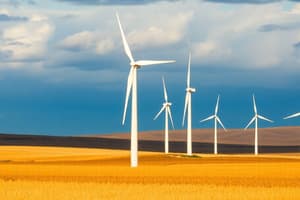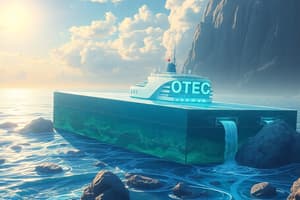Podcast
Questions and Answers
Match the following forms of renewable energy with their descriptions:
Match the following forms of renewable energy with their descriptions:
Wind energy = Energy harnessed from the movement of air Geothermal energy = Energy derived from the heat within the Earth Biomass energy = Energy generated from organic materials such as wood, agricultural crops, and waste Tidal energy = Energy obtained from the gravitational pull of the moon and the sun on the Earth's water bodies
Match the following nonrenewable energy sources with their descriptions:
Match the following nonrenewable energy sources with their descriptions:
Coal = Fossil fuel formed from plant matter that lived millions of years ago Oil = Fossil fuel derived from ancient marine organisms Natural gas = Fossil fuel primarily composed of methane and other hydrocarbons Nuclear energy = Energy released from nuclear reactions, typically involving the splitting of atoms
Match the following energy sources with their advantages and disadvantages:
Match the following energy sources with their advantages and disadvantages:
Solar energy = Advantages: abundant, renewable; Disadvantages: intermittent, expensive technology Hydroelectricity = Advantages: renewable, low greenhouse gas emissions; Disadvantages: impacts on aquatic ecosystems, limited by geography Biofuel = Advantages: renewable, reduces greenhouse gas emissions; Disadvantages: competition with food production, land use concerns Wave energy = Advantages: abundant, renewable; Disadvantages: infrastructure challenges, environmental impacts on marine life
Match the following energy-related terms with their definitions:
Match the following energy-related terms with their definitions:
Match the following energy conversion technologies with their descriptions:
Match the following energy conversion technologies with their descriptions:
Flashcards are hidden until you start studying
Study Notes
Renewable Energy Forms
- To be matched with their descriptions
Nonrenewable Energy Sources
- To be matched with their descriptions
Energy Sources
- To be matched with their advantages and disadvantages
Energy-Related Terms
- To be matched with their definitions
Energy Conversion Technologies
- To be matched with their descriptions
Studying That Suits You
Use AI to generate personalized quizzes and flashcards to suit your learning preferences.





